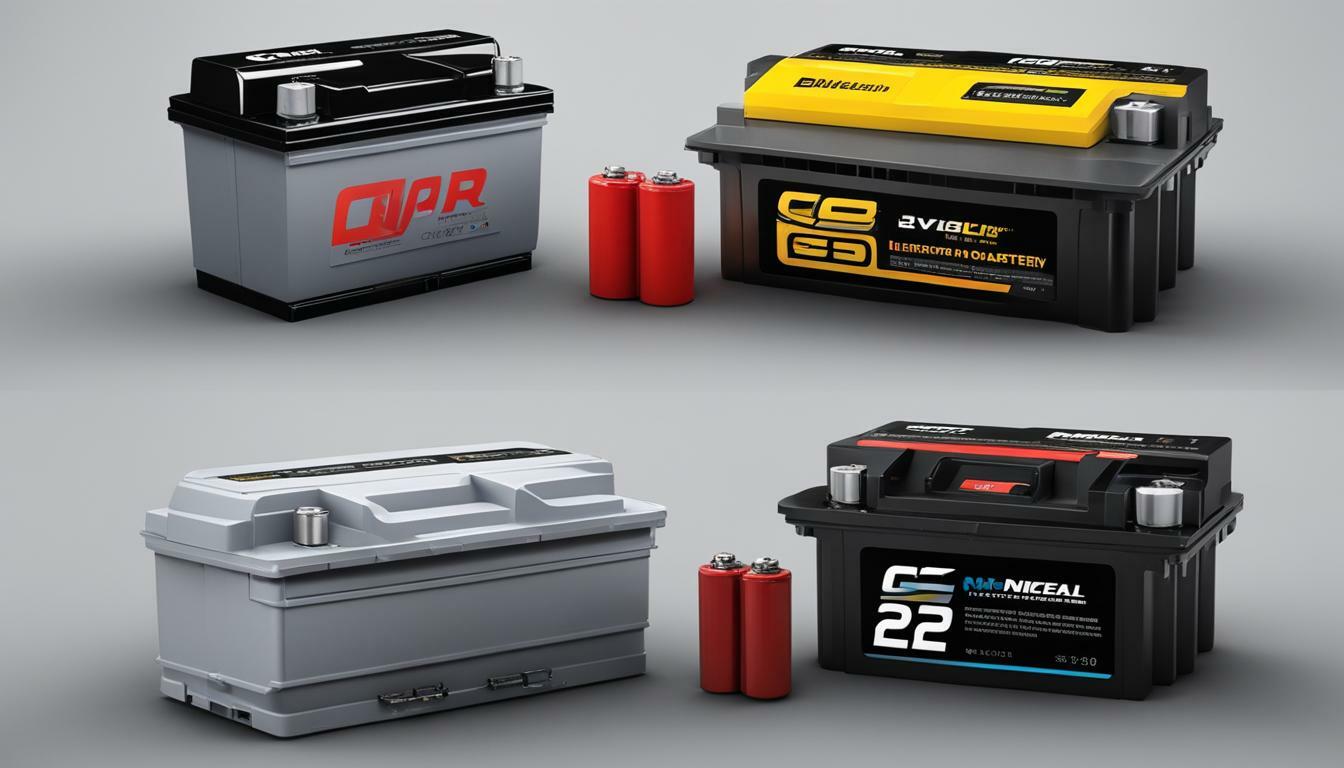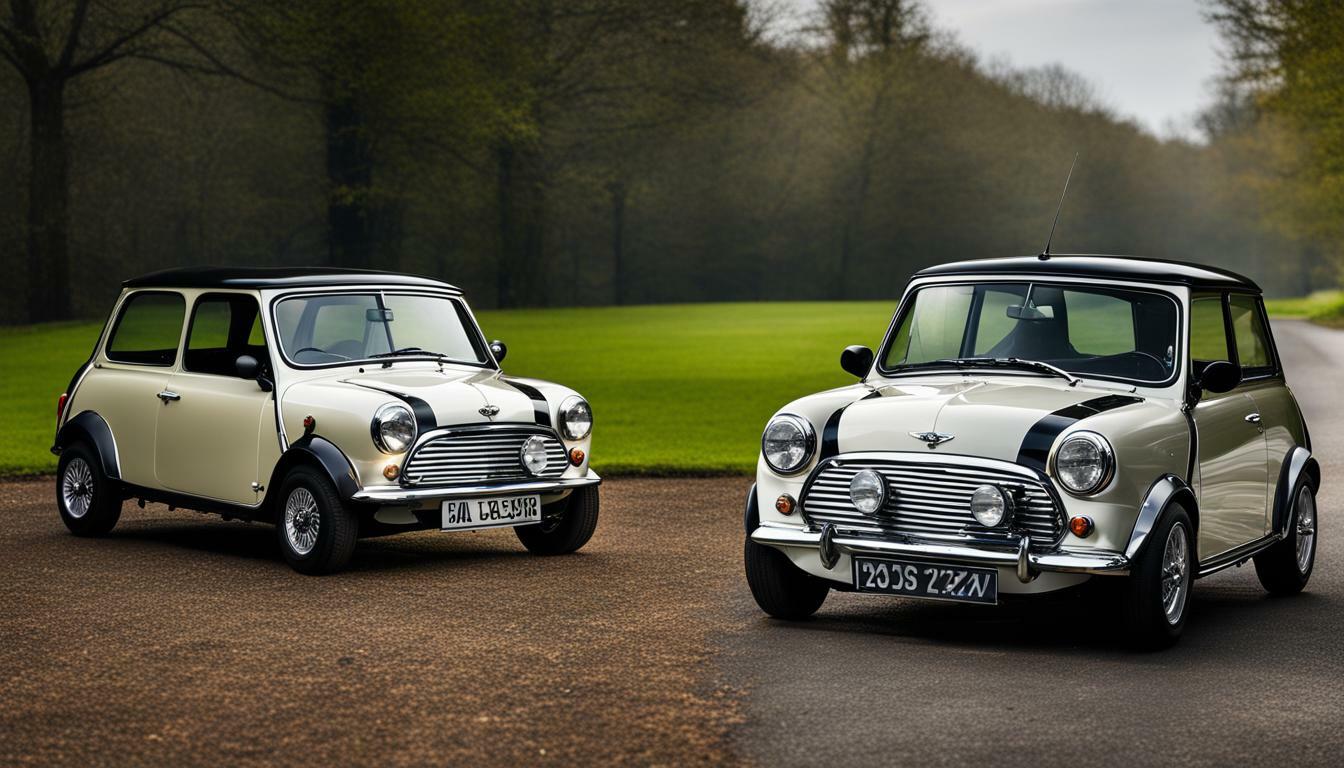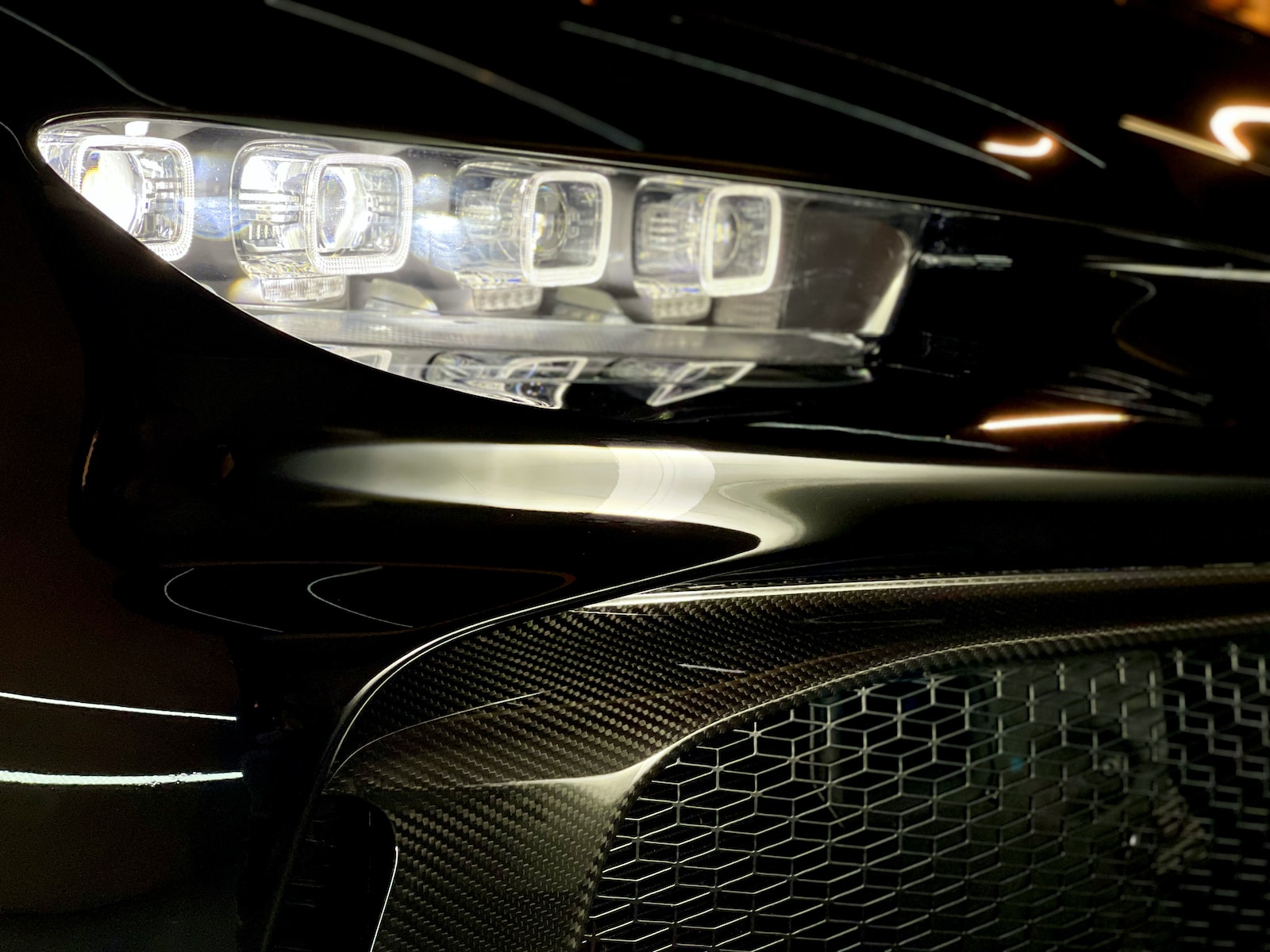When it comes to car batteries, there are two main technologies to choose from – lithium-ion and nickel-metal hydride. While both perform the same basic function of providing power to your vehicle, they differ significantly in terms of their construction, functionality, and performance.
If you’re in the market for a new car battery, it’s important to understand the differences between lithium-ion and nickel-metal hydride to make an informed decision. In this article, we’ll explore the key features of both types of batteries, their advantages and drawbacks, and their performance variations.
Key Takeaways
- Lithium-ion and nickel-metal hydride are the two main types of car batteries available.
- Lithium-ion batteries offer higher energy density, longer lifespan, and faster charging times but are more expensive and potentially hazardous.
- Nickel-metal hydride batteries are cheaper, better at performing in extreme temperatures, and are more environmentally friendly but have a lower energy density and shorter lifespan compared to lithium-ion batteries.
- Performance differences between the two types of batteries include energy density, charging efficiency, self-discharge rate, and overall power output.
- It’s important to consider the key features of both types of batteries, including their construction, chemical composition, maintenance requirements, and compatibility with different car models.
Understanding Lithium-Ion Car Batteries
Lithium-ion car batteries are gaining popularity due to their numerous advantages over traditional nickel-metal hydride batteries. Let’s explore the pros and cons of using lithium-ion batteries in your car.
Advantages of Lithium-Ion Car Batteries
- Higher Energy Density: Lithium-ion batteries have a higher energy density compared to nickel-metal hydride batteries. This means they can store more energy in a smaller space, allowing for a lighter and more compact battery.
- Longer lifespan: Lithium-ion batteries have a longer lifespan and can last up to 10 years, making them a more cost-effective option in the long run.
- Faster Charging Times: Lithium-ion batteries can be charged faster than nickel-metal hydride batteries, which is ideal for those who need to charge their car quickly and efficiently.
Disadvantages of Lithium-Ion Car Batteries
- Higher Cost: Lithium-ion batteries are more expensive than nickel-metal hydride batteries due to their advanced technology and materials.
- Potential Safety Risks: Lithium-ion batteries have a higher risk of catching fire or exploding if they are not properly maintained or charged. This is why it’s essential to only use reputable lithium-ion batteries and follow the manufacturer’s guidelines for charging and storage.
Overall, lithium-ion car batteries offer numerous advantages over nickel-metal hydride batteries, but they come at a higher cost. Before making a decision, it’s essential to consider your specific needs and budget.
Discovering Nickel-Metal Hydride Car Batteries
After exploring the advantages and drawbacks of lithium-ion car batteries, let us now shift our focus to nickel-metal hydride car batteries.
One of the main advantages of nickel-metal hydride batteries is their lower cost compared to lithium-ion batteries. However, they have a lower energy density and a shorter lifespan. Nickel-metal hydride batteries also perform better in extreme temperatures compared to lithium-ion batteries.
Another advantage of nickel-metal hydride batteries is their reduced environmental impact. They do not contain toxic heavy metals, making them easier to recycle compared to lead-acid batteries. Additionally, they have a lower risk of catching fire compared to lithium-ion batteries.
On the other hand, nickel-metal hydride batteries have a lower energy density compared to lithium-ion batteries, which means they store less energy per unit of mass or volume. They also have a shorter lifespan compared to lithium-ion batteries, which can be limiting for long-term use.
Overall, nickel-metal hydride batteries are a reliable and cost-effective option for those who require less power and a shorter lifespan for their car batteries.
Performance Differences Between Lithium-Ion and Nickel-Metal Hydride Car Batteries
When it comes to performance, there are several differences between lithium-ion and nickel-metal hydride car batteries. These differences can affect the battery’s efficiency, lifespan, and overall performance.
| Performance Factor | Lithium-Ion Battery | Nickel-Metal Hydride Battery |
|---|---|---|
| Energy Density | Higher energy density, meaning they can store more energy in a smaller space | Lower energy density, meaning they require more space to store the same amount of energy |
| Charging Efficiency | Higher charging efficiency, meaning they can be charged more quickly and with less energy | Lower charging efficiency, meaning they require more time and energy to charge fully |
| Self-Discharge Rate | Lower self-discharge rate, meaning they can hold their charge for longer periods of time | Higher self-discharge rate, meaning they lose their charge more quickly over time |
| Overall Power Output | Higher power output, meaning they can provide more power to the car’s systems | Lower power output, meaning they may struggle to provide enough power for certain systems or driving conditions |
Overall, lithium-ion car batteries tend to provide better performance than nickel-metal hydride batteries. Their higher energy density, charging efficiency, and power output make them a better choice for many car models and driving conditions. However, nickel-metal hydride batteries may be a more suitable option for some drivers, particularly those who prioritize cost-effectiveness and environmental impact.
Exploring Key Features of Lithium-Ion and Nickel-Metal Hydride Car Batteries
Lithium-ion and nickel-metal hydride car batteries are the two most common types of car batteries on the market today. But what sets them apart? In this section, we will explore the key features and characteristics of these two battery technologies, helping you to understand how they work and what makes them different.
Lithium-Ion Car Batteries Explained
Lithium-ion car batteries are highly popular due to their many advantages. These batteries are known for their high energy density, which means they can store a large amount of energy in a relatively small space. Additionally, they have a longer lifespan compared to nickel-metal hydride batteries, with some lithium-ion batteries lasting up to 10 years. They also have a faster charging time, making them a more convenient option for car owners.
One of the disadvantages of lithium-ion batteries is their higher cost compared to nickel-metal hydride batteries. Additionally, these batteries can be prone to overheating and, in rare cases, catching fire. However, manufacturers have implemented safety features to prevent these issues from occurring.
Nickel-Metal Hydride Car Batteries Explained
Nickel-metal hydride car batteries have been used in hybrid and electric vehicles for many years. These batteries are less expensive than lithium-ion batteries, making them an attractive option for car manufacturers looking to keep costs down.
Nickel-metal hydride batteries also perform well in extreme temperatures, such as those found in cold climates. They have a lower self-discharge rate than lithium-ion batteries, meaning they can hold their charge for longer periods of time without being used. However, their energy density is lower than that of lithium-ion batteries, meaning they can store less energy in the same amount of space.
Construction and Maintenance
Lithium-ion and nickel-metal hydride car batteries are constructed differently. Lithium-ion batteries contain a lithium cobalt oxide or lithium iron phosphate cathode, while nickel-metal hydride batteries contain a nickel oxyhydroxide or rare-earth metal hydride cathode. Additionally, lithium-ion batteries require a battery management system to control their charging and discharging, while nickel-metal hydride batteries do not.
In terms of maintenance, lithium-ion batteries require little to no maintenance, while nickel-metal hydride batteries may require occasional fluid changes and other maintenance tasks.
Overall, both lithium-ion and nickel-metal hydride car batteries have their advantages and disadvantages. By understanding the key features of these batteries, you can make an informed decision when choosing the most suitable battery for your vehicle.
Conclusion
In conclusion, it is clear that both lithium-ion and nickel-metal hydride car batteries have their own unique strengths and weaknesses.
Lithium-ion batteries have higher energy density, longer lifespan, and faster charging times. However, they are more expensive and can pose safety risks if not properly maintained.
Nickel-metal hydride batteries are more cost-effective, perform better in extreme temperatures, and are environmentally friendly. However, they have lower energy density and a shorter lifespan compared to lithium-ion batteries.
When choosing a car battery, it is important to consider your specific needs and requirements. If you prioritize high performance and can afford a higher price point, a lithium-ion battery may be the best choice for you. On the other hand, if you are looking for a more affordable and eco-friendly option that performs well in extreme temperatures, a nickel-metal hydride battery may be the way to go.
Ultimately, by weighing the advantages and disadvantages of both battery technologies, you can make an informed decision that best suits your needs and budget.
FAQ
Q: What is the difference between lithium-ion and nickel-metal hydride car batteries?
A: Lithium-ion car batteries have a higher energy density, longer lifespan, and faster charging times compared to nickel-metal hydride car batteries. However, lithium-ion batteries are more expensive and can pose safety risks. Nickel-metal hydride batteries, on the other hand, are cheaper, perform better in extreme temperatures, and have a lower environmental impact. However, they have lower energy density and shorter lifespan.
Q: What are the advantages of lithium-ion car batteries?
A: Lithium-ion car batteries have a higher energy density, meaning they can store more energy in a smaller size. They also have a longer lifespan and can be charged faster than other battery technologies. These batteries are commonly used in electric vehicles due to their efficiency and performance.
Q: What are the disadvantages of lithium-ion car batteries?
A: The main disadvantage of lithium-ion car batteries is their higher cost compared to other battery technologies. There are also safety concerns associated with lithium-ion batteries, such as the potential for overheating or fire. However, advancements in technology and safety measures have mitigated these risks significantly.
Q: What are the advantages of nickel-metal hydride car batteries?
A: Nickel-metal hydride car batteries are generally cheaper compared to lithium-ion batteries. They also perform better in extreme temperatures, making them suitable for harsh weather conditions. Additionally, nickel-metal hydride batteries have a lower environmental impact, as they do not contain toxic materials like lead-acid batteries.
Q: What are the disadvantages of nickel-metal hydride car batteries?
A: The main drawback of nickel-metal hydride car batteries is their lower energy density, meaning they can store less energy compared to lithium-ion batteries. They also have a shorter lifespan and may require more frequent replacement. However, advancements in battery technology have improved their performance over the years.
Q: How do lithium-ion and nickel-metal hydride car batteries differ in performance?
A: Lithium-ion batteries have a higher energy density and charging efficiency compared to nickel-metal hydride batteries. They also have a lower self-discharge rate, meaning they can retain their charge for longer periods when not in use. Overall, lithium-ion batteries offer higher power output and better performance in terms of energy storage.
Q: What are the key features of lithium-ion and nickel-metal hydride car batteries?
A: Lithium-ion car batteries are constructed using lithium compounds and offer higher energy density. They require minimal maintenance and are compatible with various car models. Nickel-metal hydride car batteries, on the other hand, use a combination of nickel, metal hydride, and other materials. They may require occasional maintenance and are also compatible with a range of car models.
 Skip to main content
Skip to main content


